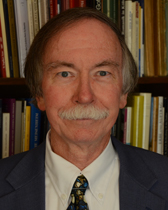Richard Kieckhefer
Professor Emeritus of Religious Studies and History

- kieckhefer@northwestern.edu
- (847) 491-2614
- Crowe Hall, 1860 Campus Drive, 4-141
Richard Kieckhefer is the John Evans Professor Emeritus of Religious Studies. His research interests focus mainly on late medieval religious culture, with special interest in local religion, sainthood and mysticism, witchcraft and magic, and related themes. His most recent book, The Mystical Presence of Christ (Cornell, 2022), explores the relationship between ordinary and exceptional religious experience in the late medieval West. He has also published European Witch Trials (Routledge & Kegan Paul; 1976), Repression of Heresy in Medieval Germany (Pennsylvania, 1979), Unquiet Souls (Chicago, 1984), Magic in the Middle Ages (Cambridge, 1989), Forbidden Rites (Sutton and Penn State, 1997), and Theology in Stone (Oxford, 2004). A theme underlying much of his research is the way in which communities create and sustain a sense of shared culture in the face of difference, dissention, and dispute.
Selected Works
Books
European Witch Trials: Their Foundations in Popular and Learned Culture, 1300-1500 (London: Routledge & Kegan Paul; Berkeley: University of California Press, 1976).
Unquiet Souls: Fourteenth-Century Saints and Their Religious Milieu (Chicago: University of Chicago Press, 1984; paperback, 1987).
Magic in the Middle Ages (Cambridge: Cambridge University Press, 1989; New York: Cambridge University Press, 1990; reissued 2000 as a Canto book; translated into German, Spanish, Italian, Greek, Polish, Portuguese, Czech, Korean, and Turkish).
Forbidden Rites: A Necromancer's Manual of the Fifteenth Century (Stroud: Sutton, 1997; University Park: Penn State University Press, 1998).
Theology in Stone: Church Architecture from Byzantium to Berkeley (New York: Oxford University Press, 2004).
The Mystical Presence of Christ: The Exceptional and the Ordinary in Late Medieval Religion (Medieval Societies, Religions, and Cultures Series) (Ithaca, N.Y.: Cornell University Press, 2022).
Articles
“Meister Eckhart's conception of union with God,” Harvard Theological Review, 71 (1978), 203-25
“Major currents in late medieval devotion,” in Jill Raitt, ed., Christian Spirituality, 2 (New York: Crossroad, 1987), 75-108
“The specific rationality of medieval magic,” American Historical Review, 99 (1994), 813-36
“The holy and the unholy: sainthood, witchcraft, and magic in late medieval Europe,” Journal of Medieval and Renaissance Studies, 24 (1994), 355-85
In Scott L. Waugh and Peter D. Diehl, eds., Christendom and Its Discontents: Exclusion, Persecution, and Rebellion, 1000-1500 (Cambridge: Cambridge University Press, 1996), 310-37
“The office of inquisition and medieval heresy: the transition from personal to institutional jurisdiction,” Journal of Ecclesiastical History, 46 (1995), 36-61
“Convention and conversion: patterns in late medieval piety,” Church History, 67 (1998), 32-51
“Mythologies of witchcraft in the fifteenth century,” Magic, Ritual, and Witchcraft, 1 (2006), 79-107
